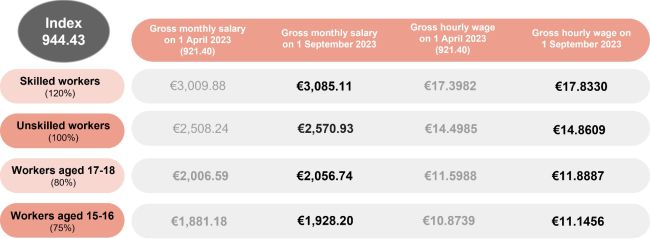- in European Union
- in European Union
- within Real Estate and Construction, Insolvency/Bankruptcy/Re-Structuring, Litigation and Mediation & Arbitration topic(s)
- with readers working within the Banking & Credit and Basic Industries industries
From 1 September 2023, the index applicable to salaries increases from 921.40 to 944.43. This index increase results in a mandatory 2.5% increase in the gross salary paid under employment contracts that are subject to Luxembourg law. This salary indexation follows the recent vote on tax measures for households that was decided during the tri-party agreement of 3 March 2023.
From 1 September 2023, the index applicable to salaries increases from 921.40 to 944.43.
This index increase results in a mandatory 2.5% increase in the gross salary paid under employment contracts that are subject to Luxembourg law.
Salary indexation is an automatic measure to adjust salaries in line with the evolution of living costs as determined by STATEC1. Therefore, there will be an automatic increase in salaries as the consumer price index has increased by 2.5% over the previous 6 months. The objective of this measure is to use a salary increase to compensate employees for their loss of purchasing power due to inflation.
This means that from 1 September 2023, the gross minimum salary for workers will increase by 2.5% as follows:

However, the cost of this new indexation is assumed in part by the State. Tri-party negotiations were held to ease the impact of salary increases for employers. The compensation is implemented by means of a temporary adjustment in the contributions that employers must pay to the Mutualité des Employeurs insurance fund as outlined by the law of 26 July 2023 2, which entered into force on 5 August 2023.
This index increase is in addition to other tax measures that have recently been approved for households. Following the tri-party agreement of 3 March 2023, the law of 5 July 2023 3 in particular provides for the adjustment of tax scales as of the 2024 tax year, in order to maximise the effect of salary indexation.
The change in the rate of income tax for natural persons will be in line with inflation and will cover 2.5 index brackets.
In the meantime, the law also establishes an "economic tax credit" (crédit d'impôt conjoncture) that aims to mitigate the fact that the rate adjustment is delayed and the energy tax credit expired on 31 March 2023. This measure will therefore only be applicable to the 2023 tax year.
These measures will have a positive impact on net income for households and boost Luxembourg's attractiveness, while also not impacting salary payments for companies.
Our Employment Law, Pensions & Benefits team is at your disposal if you have any questions_
Footnotes
1. National Institute of Statistics and Economic Studies of the Grand Duchy of Luxembourg.
2. Law of 26 July 2023 derogating from articles 55 and 56 of the Social Security Code in relation to the agreement between the Government, the Luxembourg Employers' Association (UEL) and the OGBL, LCGB and CGFP trade unions of 7 March 2023.
3. Law of 5 July 2023 modifying: i) the amended law of 4 December 1967 on income tax; ii) the amended law of 12 May 2022 establishing financial compensation to enable a temporary reduction in the sales prices of certain oil products.
The content of this article is intended to provide a general guide to the subject matter. Specialist advice should be sought about your specific circumstances.



